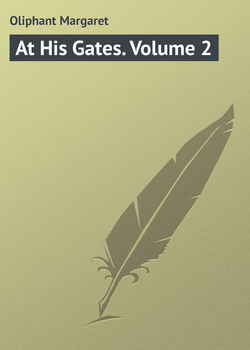Читать книгу At His Gates. Volume 2 - Маргарет Олифант, Oliphant Margaret - Страница 4
CHAPTER IV
ОглавлениеAnd everything settled down, and Nature resumed her common round. This is what Nature does in all circumstances. There never was so bad a storm but next morning the thrifty mother took heart and set to work again as best she could to make amends for it. It is only when the storm affects human hearts and lives that this cheerful, pathetic effort to get the better of it becomes terrible; for the mending in such cases is so often but superficial, the cure impossible. Other trees grow up to fill the gap made by the one blown down; but not other loves or other hopes. Yet gradually the tempest calms, the wreck is swept away, and some things that are new are always better than some things that were old, even though the old can never be replaced while life goes on.
Of all the dwellers in the Gatehouse, it was poor Haldane who felt this the most. The reality of this life in the country was very different from the anticipation. The fresh air which his mother had hoped to have for Stephen – the cottage garden which they had all dreamt of (even he himself by moments), where he could be wheeled in his chair to sit under the apple-tree and smell the flowers – had vanished from their list of possibilities. All the fresh air he could have was from the open window by which his chair was placed. But not even the garden and the apple-tree would have done so much for him as the varieties of the country road. Instead of the garden walls at Victoria Villas, the strip of dusty grass, the chance sight of a neighbour's child at play, or (more likely) of a neighbour's clothes hung out to dry, he had a genuine rural highroad, with all its sights. He saw the carts passing with rural produce, full of big baskets of vegetables for the London market; he saw the great waggons of odorous hay, with a man asleep on the top, half-buried in the warm and fragrant mass, or cracking his whip on the path, and shouting drowsy, inarticulate calls to the horses, who took their own way, and did not mind him; he saw the carriages gleam past with the great people, whom by degrees he got to know; and then the Rectory children were always about, and Mrs Dalton in her pony-chaise, and the people coming and going from the village. There were two of the village folk in particular who brought a positive pleasure into his life – not a pair of lovers, or any pretty group, but only Clippings, the tailor, and Brown, the shoemaker, who strolled down the road in the evening to smoke their pipes and talk politics as far as the Rectory gate. Clippings, who lived 'up town,' was always decorous in his shabby coat; but Brown, whose shop was 'at the corner,' came in his shirt-sleeves, with his apron turned up obliquely to one side. They would stop just opposite his window when they got hot in their discussion. Sometimes it was the parish they talked of, sometimes the affairs of the state, and it was in Stephen's mind sometimes to invite them to cross the road, and to have his say in the matter. They were not men of education or intelligence perhaps; but they were men, living the natural human life from which he had been torn, and it did him good to watch them. After a while they began to look over at him and take off their hats, half with village obsequiousness to a possible customer, half with natural feeling for a soul in prison; and he gave them a nod in return.
But this vulgar fancy of his was not quite approved of within. 'If you are so friendly with these men, Stephen, you will have them coming over, and poisoning the whole house with tobacco,' Mrs Haldane said, with an expressive sniff. 'I think I smell it even now.' But his mother was not aware that the scent of the tobacco was like an air of paradise to poor Stephen, who had loved it well enough when he was his own master, though it had become impossible now.
